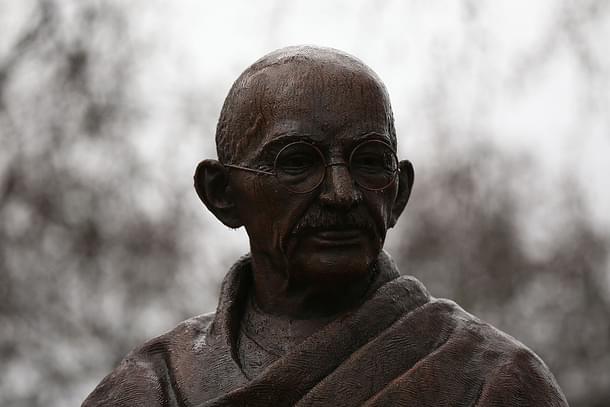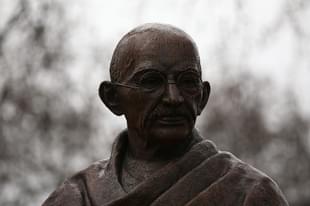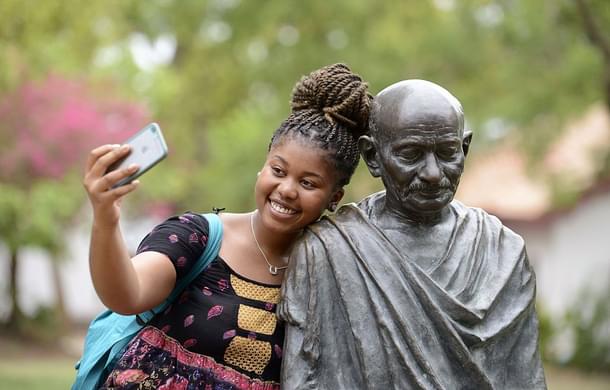Culture
Trivialising Racism: Gandhi’s Life And Legacy
Vamsee Juluri
Oct 14, 2016, 08:04 PM | Updated 08:04 PM IST
Save & read from anywhere!
Bookmark stories for easy access on any device or the Swarajya app.


The word “racist” has entered Indian everyday discourse in a fairly ubiquitous way now. There have been spates of media headlines declaring that Indians are the most “racist” people in the world (for, among other things, saying on a survey that they would be picky about whom they would like to live next to) and in the wake of these has come a renewed round of allegations about Gandhi being racist following a decision by a university in Ghana to relocate his statue.
While there is no denying attitudes, behaviors and systemic forms of hatred, discrimination and a violence against whole groups of people that a word like racism implies, it is also important to understand how and why a nation of a billion people itself victimized by imperial racism suddenly finds itself ready to call itself and its icons racists so easily.
Is it a leftover from the Aryan Invasion theory days, a strange fascination among Indian elites that if the liberal whites accept their racist pasts then so must liberal Hindus (because according to them we are Aryan Invaders/Migrants maybe?) Or is it a genuinely accurate way of fighting whatever is wrong with Indian society?
By all admissions, some of Gandhi’s early writings show him using a white racist term for blacks, and professing his perceived sense of moral superiority in comparison to them. There is no excuse for these thoughts or words, and anyone who admires Gandhi should accept that he was flawed or ignorant, or at least poorly informed. But is it really accurate, and useful to the cause of fighting racism, to brand him as a racist? That is the question.
Qualifying “racism” from racism’s victims
Consider two examples. In the wake of police atrocities and growing protests as part of the Black Lives Matter movement, some Americans (presumably mostly whites) have sought to reject this platform, or at least say “All Lives Matter.” The idea is that it would be "racist" to ignore white suffering. It is also not uncommon for some to describe blacks as racists for criticizing whites. Or women as sexists for criticizing men. However, this sort of usage, along with the ‘reverse racism’ charge, is often criticized in the liberal arts classroom as being unaware of the real histories of inequality and suffering. The question we need to ask ourselves is this: is calling Gandhi, a colonial subject and a man of color a racist not equivalent to the ahistorical assumption that racism is a loose term that can be applied to anyone simply because they used poor language?
There are reasons for and against this. On the one hand, Gandhi was a privileged colonial subject, and identified with the British rule, so we might still view his early days as inadequately antiracist, at the very least. On the other hand, Gandhi’s only view of the world was what he had learned from his colonial education, and even if he fancied himself superior to Africans (mainly on the strength of a night in jail, an unrepresentative introduction and culture shock if there were one), he was still in the same subjugated camp as a colonized person of color.

The real question of course is whether he changed. Some critics think he never “renounced” his past, much in the manner of several Hinduphobic critics who come in believing all Hindus think they are a superior Nazi like Aryan race and have something to demonstratively renounce. The truth is that what Gandhi grew into, and his legacy for anticolonial and antiracist struggles, all speak for themselves. While examining his limitations and flaws is not unwelcome, ignoring the entirety of his life and actions to proclaim that he was a racist is not. Is it not, at the very least, condescending and insulting to the intelligence of the many anti-racist leaders around the world who saw mostly inspiration in Gandhi’s work and life? Or do the pamphleteers believe that they have somehow discovered some “true” Gandhi everyone else was not bright enough to see through?
The Great Soul Hoax
Readers might recall the wild internet sensationalism that followed the publication of Joseph Lelyveld’s book Great Soul about five years ago. Blogs, tweets, and Facebook posts went around proclaiming that a new book had “exposed” the “real Gandhi” as a “fraud” and a “racist” among other things. The source of that rumor gone wild was a skewed review of the book in the Wall Street Journal by an imperial apologist who ignored much of its nuanced argument to advance his own preconceived package of anti-Gandhi propaganda. Great Soul was an unusual book in the sense that it laid out important critiques of Gandhi’s actions, sketched out his limitations and possible errors, left enough room to recognize some of his thought and reasoning on his own terms, and also threw out some tantalizing innuendos as if to orchestrate a media furor, a ban, and some commercial success (a Gandhi and bin Laden reference was not quite picked up on, though other rumors were). The book was too balanced to have savaged Gandhi, but the ephemeral fury of the internet share-storm did.
The Great Soul controversy should draw our attention to one aspect of Gandhi historiography that has not been adequately addressed amidst the vast scholarship that exists on him: our periodic rediscoveries of Gandhi as inspiration or demon have a lot more to do with our prevalent media codes rather than any one simplistic or one-dimensional truth that he can be reduced to. In my course Gandhi in the Media, we explore the depiction of Gandhi in numerous movies and books from the 1920s to the present, and look at the codes of deification and demonization that mark much of his popular depictions. It is not surprising perhaps that the rise of sensationalistic claims about this or that new book or article exposing the “real Gandhi” are taking place in a media culture dominated by sensationalistic tabloid journalism and the supposed “reality show” genre. Whether it is religious leaders, politicians, or sports celebrities, the ratings-driven narrative of toppling gods from pedestals is a well-rehearsed one these days. And Gandhi, a man who has reached the farthest reaches of iconic free flight of the randomly quoted bumper sticker, obviously has much attention to generate in his occasional free falls as well.
Questioning hagiography and demonization
We need to ask the same question we would of hagiographies of Gandhi when it comes to hit pieces against him. What interests does demonizing (or deifying) Gandhi serve? Is it only the mere cause of truth, as some activists and scholars believe, or is some sort of a deeper project of disempowerment of those Gandhi is identified with also being advanced, knowingly or unknowingly? Romain Rolland’s biography of Gandhi found a willing audience reportedly because of the European backlash to the horrors of the first world war. In India, the projection of Gandhi as a saintly leader lends itself to more complex questions now, as some Dalit and Hindu positions view his elevation with suspicion. Needless to say, some old British Leftist positions with all their admiration for the idea of Pakistan chide Gandhi for his too much Hinduness. Why did Gandhi end up as a Mahatma? Some argue that it was the empire’s master stroke in emasculating Hindu revolutionary spirit, while others believe that it was some tease he led them on in terms of a promised conversion to Christianity in the end that did not happen. And the wholesale appropriation of Gandhi after independence by a political dynasty is also well known.
Similarly, one may also ask the question of who gains by the demonization of Gandhi today. If a reasonable criticism of Gandhi enables the long overdue recognition of other voices and personalities ignored or suppressed in the pantheons of public memory in Ghana, or in India, for that matter, it is most welcome. If questioning Gandhi as a symbol of Indian privilege in Africa empowers Africans, so be it, and I have no quarrel with those who wish to replace Gandhi’s statues with others closer home. However, the widespread and reactive demonization of Gandhi cannot be blindly subscribed to in my view for reasons that are as much ethical, spiritual, and intellectual as they are simply strategic. Even if some Hindus and Indians wish to distance themselves from him, Gandhi remains a symbol of Hinduism and India, and demonizing him is often times a simple way of demonizing Hinduism and India. That is a fact, and as far as I know there is no way around it. You cannot fight forces clearly hostile to Hindu existence and Indian integrity while also supporting their positions against Gandhi. That is a strategic challenge.
The bigger issue though is what will happen to a supposedly Hindu movement that operates in a purely superficial, tribalistic, skin versus skin level. The Hindu critique of Gandhi is something that has been often ignored or condemned by Hinduphobic scholars as an example of Hindutva-extremism, and it deserves to be better understood for sure. The reality of Hindu suffering in our own land, from Moplah to Noakhali, cannot be explained or equivocated away with some secular self-relativizing theories about equal-opportunity “communal violence.” On the one side was a clearly well-developed international ideology of violence and coercion, and the other was something that some clearly blame Gandhi for. I think that anyone who opposes violence and coercion ought to call out the horrors for what they are, and to criticize Gandhi for his failure to stand up for Hindus is not uncalled for in my view. But to presume, on the basis of snippets and quotes from his writings that Gandhi hated Hindus, or Jews, or anybody for that matter, is a figment of a hate-filled imagination, and needs some healing, and effort towards understanding.
Perspectives on past and future
I think that one good way for today’s generation of Indian scholars to see Gandhi is like that of a child who grows up to see his or her parents are human too. Not only are they not divine beings, but they are imperfect ones, and sometimes even do foolishly self-defeating things despite the efforts of those knew better. Confronting these limitations, and learning from them, are vital to our survival and to future generations’ well-being as well. But there are always challenges and limitations of our own we may not be aware of when we rise to the task of rejecting our elders and our past.
I view Gandhi’s legacy, and my role in engaging with it in my classes and writing, in the same way. There is much to criticize in him, but I also think that it is important to bear the whole of his life and actions in mind while doing so. I can clearly accept that some of his views and actions were questionable, and to anyone who has been pained, Dalits, Africans, Hindus, others, I offer my prayers and apologies that someone we admire might not have seen how he might have been a cause of your pain. But I cannot stop seeing one thing plainly, and that is a man who lived one hundred years before my time and who put his body wholeheartedly into what he believed, starving, praying, walking, emptying himself of the comforts and luxuries many of us crave. And what is more, he put his body into the places where few with his privileges might have gone, from battlefields to slums.
When I read in Aravindan Neelakandan’s recent article about Gandhi’s actual hands-on care of wounded Africans I had to wonder if someone we so easily call a racist would have actually cared to do that.
Gandhi’s life was essentially a journey into bhakti. It manifested in his actions, in his manifesto (Hind Swaraj), and in the feelings he stirred among the people of India. Whether all this single-handedly won India freedom as the popular mythology says is indeed questionable. But in the end, by virtue of his life or his image or a bit of both, millions of Indian-origin people have enjoyed the privileges of goodwill around the world for which we must remain accountable. If any people continue to face certain problems today because of his actions, then by all means let us face them and learn from them. But let us grow beyond the trial by cut and paste of his memory and his legacy. Consider one example to put Gandhi’s “kafir” terminology in context. When my generation was in school we used words like “man” for “human” and “his” for both genders as that’s what we were taught. This was before such practices were deemed as sexist. Today we are for the most part more sensitive, and college writing guides enforce neutral and non-sexist language. Now what if someone in a few decades pulls up quotes from our early writing and brands us as sexists for it, would it not be worth examining the whole of our work and thought before buying into that assertion? Gandhi wrote and believed in some racist myths in his younger days. But he was not a racist. He was one of the biggest foes of racism this world has seen.
Vamsee Juluri is a Professor of Media Studies at the University of San Francisco and the author of several books including ‘Rearming Hinduism’ and ‘The Kishkindha Chronicles’ (forthcoming from Westland in January 2017)





